In 2019, Jessica Meyer’s first composer/performer portrait album Ring Out highlighted her lyrical, expressive works that celebrate the arts of interpretation and performance. In her sophomore effort, I long and seek after, she focuses solely on vocal music that features poetry by female and underrepresented writers who tackle universal themes such as loneliness, desire, love, heartbreak, justice, and the courage to embark on a journey of discovering oneself.
In 2019, Jessica Meyer’s first composer/performer portrait album Ring Out debuted at number #1 on the Traditional Classical Billboard chart. In her sophomore effort, I long and seek after, she focuses solely on vocal music that features poetry by female and underrepresented writers who tackle universal themes such as loneliness, desire, love, heartbreak, justice, and the courage to embark on a journey of discovering oneself.
Meyer writes:
“My earnest work as a composer started at the age of 40, when I could no longer ignore the task of truly figuring myself out. I naturally gravitated toward art song for several reasons: the first being the ridiculous amount of hours spent watching MTV in the 80’s and that subsequent imprinting on my musical sensibilities; the second being how so much of my performance career happened to be in collaboration with many amazing vocalists; and finally how thankful I am that the combination of words and music together was the only thing that could attempt to explain or express what was going on inside me as I made efforts to find out exactly who I was. Ever since I started composing, I have been dedicated to writing art song where instruments other than the piano evocatively give sonic emotional support to vocalists. This album showcases the many collaborations I have had since 2016, and it also comes when I turn 50 this year. Instead of pining for younger days, I celebrate this with excitement – especially when I am in such awe of the wonderful artists I am fortunate enough to call my colleagues.”
Read MoreSpace, in Chains is a set of three songs using the text of acclaimed poet Laura Kasischke. Her poetry is a series of abstract, yet vivid episodes that paint a surrealist portrait of everyday suburban life and these three particular poems address loss in very different ways.
Welcome to the Broken Hearts Club features the poetry of then seventeen-year-old Weatherspoon, whose verses speaking about the glory, the beauty, the awkwardness, and the inconvenience of love reflect those of someone in their 40’s instead of the young person we have before us. Meyer says, “In this piece, I take inspiration from various song genres – from Art Song and Opera to Broadway and Pop – while painting an aural canvas that gives much room to showcase the emotional gravitas of the text.”
The text for Things I forgot to tell you is taken from a letter written by Anaïs Nin to Henry Miller, during a year where her revelatory sexual and spiritual awakening evolved in tandem with her bouts of obsessive love, captured eloquently in her religiously kept journals. The violist serves to tell the story of the text – from using harmonics as if they are instead playing an indigenous flute, to a series of florid and passionate gestures to express that moment when one is blind to anything else but the built-up fantasy of how one perceives the situation.
Jennifer Beattie is a poet (and mezzo-soprano) who writes very emotionally direct text. This is exuberantly showcased through Meyer’s visceral musical narrative in On fire, no…after you. According to Meyer, “It is about that moment when you realize you have fallen in love and that breathless-passionate-yet-anxiously-fragile feeling that can overwhelm you in the early stages of such a relationship.”
The Last Rose is a setting of Thomas Moore’s poem “The Last Rose of Summer” that also serves as a commentary on how certain uses of social media, the internet, and texting can make humans feel even lonelier than before this technology was invented.
The title work, I long and seek after, uses Anne Carson's translation of Sappho fragments as a 21st Century response to Schumann's famed song cycle Frauenliebe und Leben. Meyer writes, “While the final movement of his work signaled the end of a woman's hopes and dreams with the death of her husband, I instead wanted to depict women having the courage to live their lives boldly, while growing older gracefully, assuredly, and proudly.”
Digital Booklet available here:
www.newfocusrecordings.com/JessicaMeyerDigitalBooklet
Welcome to the Broken Hearts Club, The Last Rose, Things I forgot to tell you
Produced and Edited by Mike Tierney
Recorded at Virtue and Vice Studios, Brooklyn, NY
Space, in Chains & On fire...no, after you
Produced and Edited by Ryan Streber
Recorded at Oktaven Audio, Mount Vernon, NY
I long and seek after
Produced and Edited by Mike Tierney
Recorded at Mad Oak Studios, Allston, MA
*commission made possible by the Dale Warland Singers Commission Award from Chorus America in partnership with the American Composers Forum*
Things I forgot to tell you text used with permission by the Anaïs Nin Foundation
Space, in Chains text used with permission by Laura Kasischke and Copper Canyon Press
I long and seek after text used by permission of Anne Carson and Aragi Inc.
On fire...no, after you & Welcome to the Broken Hearts Club text used with permission by the poets
Cover photo by Benjamin Fingland
Additional photos by Michael Meyer, Melissa Wimbish, and Kayleigh Butcher
Video stills by Danie Harris and Ford Fourqurean
Jessica Meyer headshots by Titilayo Ayangade
Graphic Design by Denise Burt
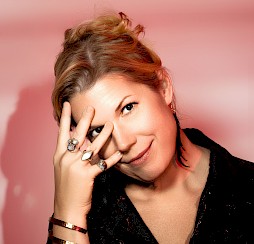
With playing that is “fierce and lyrical” and works that are “other-worldly” (The Strad) and “evocative” (The New York Times), Jessica Meyer is an award-winning composer and violist whose passionate musicianship radiates accessibility and emotional clarity. Meyer’s compositions viscerally explore the wide palette of emotionally expressive colors available to each instrument while using traditional and extended techniques inspired by her varied experiences as a contemporary and period instrumentalist. Since embarking on her composition career at the age of 40, premieres have included performances by GRAMMY-winning vocal ensembles Roomful of Teeth and Vox Clamantis, the St. Lawrence String Quartet as the composer in residence at Spoleto Festival USA, the American Brass Quintet, PUBLIQuartet, Sybarite 5, NOVUS NY of Trinity Wall Street, a work for A Far Cry commissioned by the Isabella Stewart Gardner Museum in Boston, the Juilliard School for a project with the Historical Performance Program, and by the Lorelei Ensemble for a song cycle that received the Dale Warland Singers Commission Award from Chorus America. She has also received multiple commissioning awards from both Chamber Music America and the New York State Council on the Arts.
Her first Symphonic Band piece was commissioned and toured by “The President’s Own” United States Marine Band (with a sold-out NY premiere in Carnegie Hall) and was a finalist for the William D. Revelli Composition Contest. Her orchestral works have been performed by the Phoenix, North Carolina, Charlotte, and Vermont Symphonies, the Nu Deco Ensemble in Miami, at Tanglewood in Seiji Ozawa Hall, and all around the country as part of Carnegie Hall’s nationwide Link Up Program. She was the winner of the 2nd Annual Ellis-Beauregard Foundation Composer’s Award to write a piece for the Bangor Symphony, and a winner of Chamber Music America’s Commissioning Program Award to write for the Argus Quartet. Recent premieres included works for the Dorian Wind Quintet, Hausmann Quartet, Hub New Music, the Portland Youth Philharmonic in collaboration with the female vocal ensemble In Mulieribus, and her viola concerto GAEA that she premiered alongside the Orchestra of the League of Composers at Miller Theatre in NYC. Upcoming premieres include works for the Bronx Arts Ensemble, the Brooklyn Art Song Society, the American Guild of Organists for their National 2024 Conference, and a new orchestral piece to be premiered by a consortium of orchestras across the United States. At home with many different styles of music, Jessica can regularly be seen as a soloist, premiering her chamber works, performing on Baroque viola, improvising with jazz musicians, or collaborating with other composer-performers. In 2023, she joined both the Viola and Chamber Music Faculty of the Manhattan School of Music.
https://jessicameyermusic.com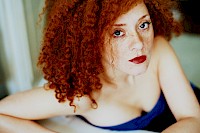 Soprano and bandleader Melissa Wimbish is a genre-defying vocalist and dedicated advocate of contemporary music. Alongside Jessica Meyer, she premiered Space, in Chains at Carnegie Hall in 2016 as the winner of the NATS Artist Award Grand Prize for excellence in art song and operatic performance. Wimbish has premiered works for the stage in roles written especially for her, most notably in the title role of Jospehine by Tom Cipullo, which depicts Josephine Baker granting an interview in her dressing room shortly before her last triumphant appearance. She sang the role of Alice in the US-premiere of Harriet by Hilda Paredes with legendary soprano Claron McFadden in the title role. Other operatic and stage roles include Cunegonde (Candide), Musetta (La bohème), Pamina (Die Zauberflöte), Bubikopf (Der Kaiser von Atlantis), Stella-Rondo (Why I Live at the P.O.), Nimue (Camelot), Barbarina (Le nozze di Figaro) as well as title roles in Manon, Roméo et Juliette, Seven Deadly Sins, and La voix humaine. Under the baton of James Gaffigan, she was a featured soloist in the revival of Leonard Bernstein’s MASS at The Kennedy Center in 2022. For National Sawdust Tracks, the soprano made her recording debut as the History Teacher in Paul’s Case by Gregory Spears and Kathryn Walat. Wimbish is a founding member of the American indie pop duo, Outcalls which includes longtime collaborator and musical partner, Britt Olsen-Ecker. They have released three studio albums including their latest full-length record, Greatest Hits, Vol. 1.
Soprano and bandleader Melissa Wimbish is a genre-defying vocalist and dedicated advocate of contemporary music. Alongside Jessica Meyer, she premiered Space, in Chains at Carnegie Hall in 2016 as the winner of the NATS Artist Award Grand Prize for excellence in art song and operatic performance. Wimbish has premiered works for the stage in roles written especially for her, most notably in the title role of Jospehine by Tom Cipullo, which depicts Josephine Baker granting an interview in her dressing room shortly before her last triumphant appearance. She sang the role of Alice in the US-premiere of Harriet by Hilda Paredes with legendary soprano Claron McFadden in the title role. Other operatic and stage roles include Cunegonde (Candide), Musetta (La bohème), Pamina (Die Zauberflöte), Bubikopf (Der Kaiser von Atlantis), Stella-Rondo (Why I Live at the P.O.), Nimue (Camelot), Barbarina (Le nozze di Figaro) as well as title roles in Manon, Roméo et Juliette, Seven Deadly Sins, and La voix humaine. Under the baton of James Gaffigan, she was a featured soloist in the revival of Leonard Bernstein’s MASS at The Kennedy Center in 2022. For National Sawdust Tracks, the soprano made her recording debut as the History Teacher in Paul’s Case by Gregory Spears and Kathryn Walat. Wimbish is a founding member of the American indie pop duo, Outcalls which includes longtime collaborator and musical partner, Britt Olsen-Ecker. They have released three studio albums including their latest full-length record, Greatest Hits, Vol. 1.
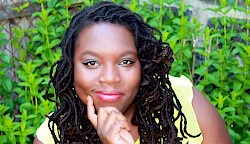 Soprano Chabrelle Williams is a dynamic singing actress and an accomplished teaching artist. Most recently, she made her artist debut with American Lyric Theater as Claudette Colvin in a new opera named She Who Dared by Jasmine Barnes and Deborah D.E.E.P Mouton. Previously, she made her soloist debut with the Charleston Symphony singing a world premiere of Songs of the Seasons by Margaret Bonds with orchestra arrangement by Edward Hart. This season, she made her Carnegie Hall debut singing the soprano solo in The Ordering of Moses by Nathaniel R. Dett. Other career highlights include: Esther Mills in Intimate Apparel by Lynn Nottage and Ricky Ian Gordon at the Lincoln Center Theater and Milica in Boston Lyric Opera’s film Svadba directed by Shura Baryshnikov. Welcome to the Broken Hearts Club was written for her and commissioned by CityMusic Cleveland. When Chabrelle is not performing, she is a teaching artist of Opera Philadelphia’s Sounds of Learning Residency, where she guides some of Philly’s 4th graders through the process of creating their own opera scenes.
Soprano Chabrelle Williams is a dynamic singing actress and an accomplished teaching artist. Most recently, she made her artist debut with American Lyric Theater as Claudette Colvin in a new opera named She Who Dared by Jasmine Barnes and Deborah D.E.E.P Mouton. Previously, she made her soloist debut with the Charleston Symphony singing a world premiere of Songs of the Seasons by Margaret Bonds with orchestra arrangement by Edward Hart. This season, she made her Carnegie Hall debut singing the soprano solo in The Ordering of Moses by Nathaniel R. Dett. Other career highlights include: Esther Mills in Intimate Apparel by Lynn Nottage and Ricky Ian Gordon at the Lincoln Center Theater and Milica in Boston Lyric Opera’s film Svadba directed by Shura Baryshnikov. Welcome to the Broken Hearts Club was written for her and commissioned by CityMusic Cleveland. When Chabrelle is not performing, she is a teaching artist of Opera Philadelphia’s Sounds of Learning Residency, where she guides some of Philly’s 4th graders through the process of creating their own opera scenes.
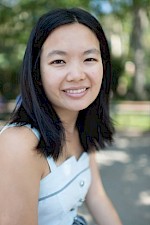 Johnna Wu is an active performer and improviser in North America, Europe, and Asia. She is the artistic director and founder of the electroacoustic ensemble PinkNoise. Her most recent appearances include performances at the University Museum of Contemporary Art in Mexico City, Elbphilharmonie in Hamburg, the Lucerne Culture and Congress Centre, Carnegie Hall, the Berlin Philharmonie, Paris Philharmonie, and the Guangzhou Opera House. She graduated from Columbia University with a Bachelor of Arts with double degrees in Biology and Musicology, obtained a Master of Music degree in violin performance at The Juilliard School, and was a Fulbright Scholar in Germany. She serves on the faculty and is a co-curator for the Lucerne Festival in Switzerland.
Johnna Wu is an active performer and improviser in North America, Europe, and Asia. She is the artistic director and founder of the electroacoustic ensemble PinkNoise. Her most recent appearances include performances at the University Museum of Contemporary Art in Mexico City, Elbphilharmonie in Hamburg, the Lucerne Culture and Congress Centre, Carnegie Hall, the Berlin Philharmonie, Paris Philharmonie, and the Guangzhou Opera House. She graduated from Columbia University with a Bachelor of Arts with double degrees in Biology and Musicology, obtained a Master of Music degree in violin performance at The Juilliard School, and was a Fulbright Scholar in Germany. She serves on the faculty and is a co-curator for the Lucerne Festival in Switzerland.
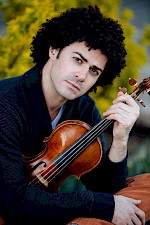 Israeli violinist Kobi Malkin, winner of the prestigious 2011 Ilona Kornhauser prize, is making his mark as both an exciting soloist and a sensitive chamber musician. Malkin has performed with important orchestras around the world including the Saint Louis Symphony Orchestra, the Chicago Philharmonic and the Jerusalem Symphony Orchestra and as an active chamber musician has collaborated with Itamar Golan, Frans Helmerson, Kim Kashkashian, Mitsuko Uchida and Peter Wiley in such festivals as Ravinia, Music@Menlo and the Marlboro Music Festival. His performances are regularly broadcast on radio in Israel and the US. A scholarship recipient of the America Israel Culture Foundation, he is an alumnus of Ensemble Connect – a joint program of Carnegie Hall, The Juilliard School and Weill Music Institute and was recently appointed concertmaster for the American Ballet Theatre orchestra. Malkin holds a Master of Music degree from the Juilliard School, where he studied with Sylvia Rosenberg and Donald Weilerstein, and a Bachelor of Music degree from the New England Conservatory, where he worked under the guidance of Miriam Fried.
Israeli violinist Kobi Malkin, winner of the prestigious 2011 Ilona Kornhauser prize, is making his mark as both an exciting soloist and a sensitive chamber musician. Malkin has performed with important orchestras around the world including the Saint Louis Symphony Orchestra, the Chicago Philharmonic and the Jerusalem Symphony Orchestra and as an active chamber musician has collaborated with Itamar Golan, Frans Helmerson, Kim Kashkashian, Mitsuko Uchida and Peter Wiley in such festivals as Ravinia, Music@Menlo and the Marlboro Music Festival. His performances are regularly broadcast on radio in Israel and the US. A scholarship recipient of the America Israel Culture Foundation, he is an alumnus of Ensemble Connect – a joint program of Carnegie Hall, The Juilliard School and Weill Music Institute and was recently appointed concertmaster for the American Ballet Theatre orchestra. Malkin holds a Master of Music degree from the Juilliard School, where he studied with Sylvia Rosenberg and Donald Weilerstein, and a Bachelor of Music degree from the New England Conservatory, where he worked under the guidance of Miriam Fried.
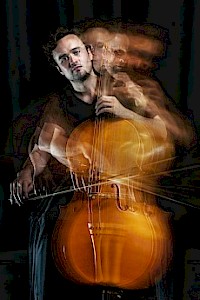 A versatile chamber musician and soloist, cellist Caleb van der Swaagh is an alumnus of Ensemble ACJW (now known as Ensemble Connect) – a program of Carnegie Hall, The Juilliard School, and the Weill Music Institute in partnership with the New York City Department of Education. Caleb is a first prize winner in the SAVVY Chamber Competition and is the recipient of the Manhattan School of Music Pablo Casals Award and the Tanglewood Karl Zeise Memorial Cello Prize and was also a grant recipient from the Virtu Foundation. As a chamber musician, Caleb has performed with the Borromeo String Quartet, The Knights, A Far Cry, and the Jupiter Symphony Chamber Players and has recently appeared at such festivals as the Chelsea Music Festival, Ottawa ChamberFest, Garth Newel Music Center, Music from Montauk, and Birdfoot Festival. Caleb’s most recent release is the Carter Clarinet Quintet with Phoenix Ensemble on Navona and he has also appeared on recordings on Albany Records, Bright Shiny Things, Supertrain Records, Linn Records, and Avie Records.
A versatile chamber musician and soloist, cellist Caleb van der Swaagh is an alumnus of Ensemble ACJW (now known as Ensemble Connect) – a program of Carnegie Hall, The Juilliard School, and the Weill Music Institute in partnership with the New York City Department of Education. Caleb is a first prize winner in the SAVVY Chamber Competition and is the recipient of the Manhattan School of Music Pablo Casals Award and the Tanglewood Karl Zeise Memorial Cello Prize and was also a grant recipient from the Virtu Foundation. As a chamber musician, Caleb has performed with the Borromeo String Quartet, The Knights, A Far Cry, and the Jupiter Symphony Chamber Players and has recently appeared at such festivals as the Chelsea Music Festival, Ottawa ChamberFest, Garth Newel Music Center, Music from Montauk, and Birdfoot Festival. Caleb’s most recent release is the Carter Clarinet Quintet with Phoenix Ensemble on Navona and he has also appeared on recordings on Albany Records, Bright Shiny Things, Supertrain Records, Linn Records, and Avie Records.
An advocate of contemporary music, Caleb is a member of counter)induction and Ensemble Échappé as well as performing with other leading new music ensembles. Among many others, Caleb has premiered works by such composers as Beat Furrer, Ted Hearne, Iancu Dumitrescu, Christian Wolff, Roscoe Mitchell, and Georg Friedrich Haas. He also regularly performs his own compositions and arrangements.
A native New Yorker, Caleb graduated magna cum laude from Columbia University as part of the Columbia – Juilliard Exchange program with a degree in Classics and Medieval & Renaissance Studies. Caleb received his master’s degree with academic honors from New England Conservatory and later studied at the Manhattan School of Music. His primary teachers are Bonnie Hampton, Bernard Greenhouse, Laurence Lesser, and David Geber. Caleb plays on a cello made by David Wiebe in 2012. For more information, visit www.calebvanderswaagh.com
https://www.calebvanderswaagh.com/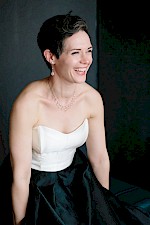 As an orchestral soloist and chamber musician, contralto Emily Marvosh has become known for generous musicality, authentic communication, charisma and poise. Recent performances include Mahler’s 2nd and 3rd Symphonies, as well as solo recitals in Maine, Massachusetts, Michigan and Arizona; she is also a frequent soloist in Early Music masterworks with period instrument ensembles across the country. Her contributions to 20th and 21st Century repertoire and performance include recent performances with the Left Coast Chamber Ensemble, Boston’s Phoenix Orchestra, and the world premiere of Scott Ordway’s The Outer Edge of Youth. She is a member of the Lorelei Ensemble, which promotes innovative new music for women. With Lorelei, she has enjoyed collaborations with composer David Lang, BMOP, the Boston Symphony Orchestra, and Pulitzer- Prize-winning composer Julia Wolfe. She belongs to Beyond Artists, a coalition of artists that donates a percentage of their concert fees to organizations they care about. She supports Gabriela Lena Frank’s Creative Academy of Music and Rosie’s Place in Boston through her performances. She holds degrees from Central Michigan University and Boston University.
As an orchestral soloist and chamber musician, contralto Emily Marvosh has become known for generous musicality, authentic communication, charisma and poise. Recent performances include Mahler’s 2nd and 3rd Symphonies, as well as solo recitals in Maine, Massachusetts, Michigan and Arizona; she is also a frequent soloist in Early Music masterworks with period instrument ensembles across the country. Her contributions to 20th and 21st Century repertoire and performance include recent performances with the Left Coast Chamber Ensemble, Boston’s Phoenix Orchestra, and the world premiere of Scott Ordway’s The Outer Edge of Youth. She is a member of the Lorelei Ensemble, which promotes innovative new music for women. With Lorelei, she has enjoyed collaborations with composer David Lang, BMOP, the Boston Symphony Orchestra, and Pulitzer- Prize-winning composer Julia Wolfe. She belongs to Beyond Artists, a coalition of artists that donates a percentage of their concert fees to organizations they care about. She supports Gabriela Lena Frank’s Creative Academy of Music and Rosie’s Place in Boston through her performances. She holds degrees from Central Michigan University and Boston University.

![]()
Described as a singer with “commanding interpretive depth” (The New York Times) as well as having a “pure vocal talent” (Opera Wire Magazine), mezzo-soprano Kayleigh Butcher has gained critical and audience acclaim as a soloist and contemporary chamber musician. Kayleigh is a founding member of Quince Ensemble, an all-treble, acappella vocal quartet that explores experimental vocal techniques and improvisation. She is also a founding member of Shepherdess with Hajnal Pivnick, an NYC-based violin and voice duo. And lastly, she is a founding member of LOVELERVLUV, a musical, performance art trio with singers Paul Pinto and Bonnie Lander. Kayleigh received her Bachelor of Music from the University of Missouri-Kansas City Conservatory, where she studied with Dr. Anne DeLaunay and Dr. Denise Knowlton. She was a graduate teaching assistant to Dr. Jane Schoonmaker Rodgers at Bowling Green State University, where she earned her Master of Music. She currently resides in Brooklyn with her dog, Simon.
http://www.kayleighbutcher.com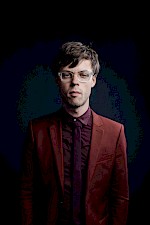 Brooklyn-based composer, pianist, and conductor Dan Schlosberg’s music has been performed by the Dover Quartet, Minnesota Orchestra, Choir of Trinity Wall Street, Nashville and Albany Symphonies, at Carnegie Hall, (le) poisson rouge, Royal Albert Hall, Beijing Modern Music Festival, and David Lynch’s Festival of Disruption, and has also been featured in The New York Times and WNYC’s Soundcheck. Dan has received the Charles Ives Scholarship from the American Academy of Arts and Letters and two ASCAP Morton Gould Awards. In addition to collaborations with Angel Blue, the Imani Winds, Ariana DeBose, Tony Kushner, and Ben Stiller, he was a pianist on the Grammy-winning soundtrack of Steven Spielberg’s West Side Story, and a featured soloist in Anthony Roth Costanzo and Justin Vivian Bond’s Only an Octave Apart with the New York Philharmonic and on NPR’s Tiny Desk. He has composed for and music directed at the Soho Repertory Theater (for which his original score for Montag received a 2023 Drama Desk nomination), Public Theater, Williamstown Theatre Festival, Baryshnikov Arts Center, Playwrights Horizons, and Ars Nova. Current projects include The Extinctionist, a new opera for Heartbeat Opera (premiering Spring ‘24), a new music-theater piece for Little Island in NYC (premiering summer ‘24), composition and music direction for Jeremy O. Harris’s A Boy’s Company Presents, and music direction for Only an Octave Apart at Wilton’s Music Hall in London (October ‘22), at the Spoleto Festival (June ‘23), and in Dublin (September ‘23). Dan is the Music Director of Heartbeat Opera, for which his radical re- orchestrations of classic operas have been praised as “flat-out brilliant” (The New York Times) and “ingenious” (Wall Street Journal).
Brooklyn-based composer, pianist, and conductor Dan Schlosberg’s music has been performed by the Dover Quartet, Minnesota Orchestra, Choir of Trinity Wall Street, Nashville and Albany Symphonies, at Carnegie Hall, (le) poisson rouge, Royal Albert Hall, Beijing Modern Music Festival, and David Lynch’s Festival of Disruption, and has also been featured in The New York Times and WNYC’s Soundcheck. Dan has received the Charles Ives Scholarship from the American Academy of Arts and Letters and two ASCAP Morton Gould Awards. In addition to collaborations with Angel Blue, the Imani Winds, Ariana DeBose, Tony Kushner, and Ben Stiller, he was a pianist on the Grammy-winning soundtrack of Steven Spielberg’s West Side Story, and a featured soloist in Anthony Roth Costanzo and Justin Vivian Bond’s Only an Octave Apart with the New York Philharmonic and on NPR’s Tiny Desk. He has composed for and music directed at the Soho Repertory Theater (for which his original score for Montag received a 2023 Drama Desk nomination), Public Theater, Williamstown Theatre Festival, Baryshnikov Arts Center, Playwrights Horizons, and Ars Nova. Current projects include The Extinctionist, a new opera for Heartbeat Opera (premiering Spring ‘24), a new music-theater piece for Little Island in NYC (premiering summer ‘24), composition and music direction for Jeremy O. Harris’s A Boy’s Company Presents, and music direction for Only an Octave Apart at Wilton’s Music Hall in London (October ‘22), at the Spoleto Festival (June ‘23), and in Dublin (September ‘23). Dan is the Music Director of Heartbeat Opera, for which his radical re- orchestrations of classic operas have been praised as “flat-out brilliant” (The New York Times) and “ingenious” (Wall Street Journal).
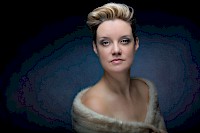 GRAMMY Award-winning soprano Sarah Brailey enjoys a versatile career that defies categorization. Praised by The New York Times for her “radiant, liquid tone,” and by Opera UK for “a sound of remarkable purity,” she is a prolific vocalist, cellist, recording artist, and educator. Sarah’s numerous career highlights include performing Handel’s L’Allegro, il Penseroso ed il Moderato with the Mark Morris Dance Group, serenading the Mona Lisa with John Zorn’s Madrigals at the Louvre in Paris, and recording the role of The Soul on the world premiere album of Dame Ethel Smyth’s The Prison, for which she received the 2020 GRAMMY Award for Best Classical Solo Vocal Album. Other notable recent and upcoming projects include the role of the Angel in Handel’s La Resurrezione with Haymarket Opera; Julia Wolfe’s Her Story with the Lorelei Ensemble and the Boston, Chicago, Nashville, National, and San Francisco Symphony Orchestras; and David Lang’s Song of Songs at the Barbican Centre. Sarah is a member of Beyond Artists, a coalition of artists that donates a percentage of their concert fees to non-profit organizations. Through Beyond Artists, she supports the Natural Resources Defense Council, Friends of the Boundary Waters Wilderness, and the Animal Welfare Institute. Sarah is the Director of Vocal Studies at the University of Chicago, the Artistic Director of the Handel Aria Competition, and serves on the voice faculty at the University of Wisconsin-Madison.
GRAMMY Award-winning soprano Sarah Brailey enjoys a versatile career that defies categorization. Praised by The New York Times for her “radiant, liquid tone,” and by Opera UK for “a sound of remarkable purity,” she is a prolific vocalist, cellist, recording artist, and educator. Sarah’s numerous career highlights include performing Handel’s L’Allegro, il Penseroso ed il Moderato with the Mark Morris Dance Group, serenading the Mona Lisa with John Zorn’s Madrigals at the Louvre in Paris, and recording the role of The Soul on the world premiere album of Dame Ethel Smyth’s The Prison, for which she received the 2020 GRAMMY Award for Best Classical Solo Vocal Album. Other notable recent and upcoming projects include the role of the Angel in Handel’s La Resurrezione with Haymarket Opera; Julia Wolfe’s Her Story with the Lorelei Ensemble and the Boston, Chicago, Nashville, National, and San Francisco Symphony Orchestras; and David Lang’s Song of Songs at the Barbican Centre. Sarah is a member of Beyond Artists, a coalition of artists that donates a percentage of their concert fees to non-profit organizations. Through Beyond Artists, she supports the Natural Resources Defense Council, Friends of the Boundary Waters Wilderness, and the Animal Welfare Institute. Sarah is the Director of Vocal Studies at the University of Chicago, the Artistic Director of the Handel Aria Competition, and serves on the voice faculty at the University of Wisconsin-Madison.
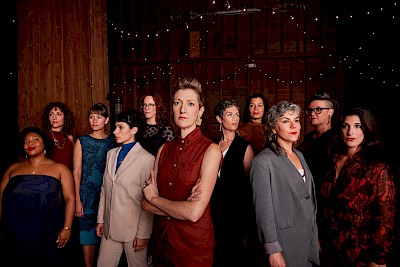 Heralded for its “full-bodied and radiant sound” (The New York Times), Lorelei Ensemble is internationally recognized for its bold, inventive programs championing the extraordinary flexibility and virtuosity of the human voice. Led by founder and artistic director Beth Willer, Lorelei has established an inspiring mission, curating culturally-relevant and artistically audacious programs that challenge artists’ and audiences’ expectations.
Heralded for its “full-bodied and radiant sound” (The New York Times), Lorelei Ensemble is internationally recognized for its bold, inventive programs championing the extraordinary flexibility and virtuosity of the human voice. Led by founder and artistic director Beth Willer, Lorelei has established an inspiring mission, curating culturally-relevant and artistically audacious programs that challenge artists’ and audiences’ expectations.
Lorelei Ensemble collaborates with leading composers to commission new works that expand and deepen the repertoire of sounds, timbres, words, and stories that women use to reflect and challenge our world. This new repertoire for women’s and treble voices allows unparalleled music making that is born from the unique position of power and cultural influence that women hold. Collaborating composers include David Lang, Julia Wolfe, George Benjamin, Kati Agócs, Lisa Bielawa, Kareem Roustom, Jessica Meyer, and more.
Lorelei Ensemble maintains a robust national touring schedule, including recent collaborations with the Boston Symphony Orchestra, Boston Modern Orchestra Project, and Tanglewood Music Center Orchestra, and performances at Carnegie Hall, the Metropolitan Museum of Art, and Boston's Symphony Hall.
On the New Focus, Sono Luminus, Cantaloupe, and BMOP Sound labels, Lorelei has recorded the music of Kati Agócs, Peter Gilbert, James Kallembach, William Billings, Guillaume Du Fay, Alfred Schnittke, and many others. Recent releases include David Lang’s love fail (Cantaloupe 2020) and Impermanence (Sono Luminus 2018).
Top 5 reasons why more string players should compose: Jessica Meyer
Violist and composer Jessica Meyer outlines why players should step out of their comfort zone with creating music, and why they may be better equipped for the practice than they realise
Once I started writing for myself and looper, and performing those pieces anywhere I could, I became a far more virtuosic player. When you regularly hear and feel the sounds you want, then immediately play them, your technique and ability to expressively interpret others’ music grows tremendously.
For the past decade, I have taught workshops where I take a group of players of varying abilities and get them to make up their own music. After guiding them through a structured improv that slowly takes away some enabling constraints, they set out into groups to make a 60 second composition expressing a particular emotion. Every single time I am astounded by the music they make because some passages are technically or musically way more advanced than their current level. Why? Because they were too busy having fun finding just the right sound to portray the feeling or energy they were trying to express to be concerned about what they can or can’t do. What if we take the concept of composing a little less seriously, and instead have fun while making choices about sound?
I always have to remind my clarinetist husband that playing in a string section is so very different than playing in a clarinet section while in orchestra. Yes, blending is super important in all wind and brass sections (and when that’s tight, it’s a really special thing). However, in a particular string section we are often called to melt into a unison sound that needs to ring just right in relation to the other string sections.
In a really great section, you develop this special ESP akin to moving like a flock of birds; where even in the back rows you can anticipate how the color, articulation, rhythm, and intent can be felt through the ranks as we breathe while part of this undulating energy blob. We know that feeling of creating homogeneous sounds in our bones, so playing around and combining ones for larger ensemble is not so far-fetched. Add years of sitting in the middle of an orchestra hearing how the greats orchestrated, I think we know plenty in order to get started creating our own works.
It is simply harder for composers who do not play stringed instruments to grasp what is really possible with our hands. There seems to be a lot of fear because many composers have been ’burned’ in the past for writing things that were not exactly effective or possible, so they err on the side of caution (or, we play a piece where we secretly wished they did).
Much of knowing what is possible with our left hand takes tactile feeling, yet we also know some secret tricks that just go beyond fingerboard charts (i.e. passages in my viola concerto GAEA sound hard, but open strings make it fun and totally doable). And the bow? It’s like learning a specific language where the slightest change in intonation can affect meaning.
The sheer number of sounds we can perform are endless. We know how to go from the whispered and fragile to hugely ringing and resonant, from sizzling and pulsating shimmers to static massive walls of sound, from quick sweeping gestures to glacially slow shifts of evolving, and how to play melodies pulled across a horizon of textures to vertically digging percussive grooves.
It’s easier for us to learn a notation program or dig deep into some music theory or orchestration beyond what we already inherently know, than it is for a composer to really learn and intuitively feel the ins and outs of all our sounds and techniques. We hold valuable insider information that we, as artists, could be sharing with the world and the string players of the future
For each time period, there evolved a specific performance practice that tapped into certain expressive qualities of our instruments. The raging vibrato of the late romantic era feels painfully out of place when playing Vivaldi and Bach. The heavy and light metric beat structure combined with the released bow strokes of the Baroque Era won’t cut it when playing Mahler, just like how a light and jazzy syncopated shuffle stroke simply does not work when deep in Shostakovich sarcasm.
Yet, if we have been performing and studying for any length of time, all of these sounds live in our bodies, and we can pull any of them out to express what we want in the pieces we interpret. Why not start using them in pieces we create ourselves in whatever combinations we want to express what we need?
Even after considering the expansive pallet of sounds modern composers have given us since the 1950s, I dare say there are even more combinations of special sounds to be discovered and expressed by those of us who know our instruments so intimately well.
Many of the composers we celebrate year after year were string players. Vivaldi, Corelli, Telemann, Bach, Hadyn, Mozart, Beethoven, Schubert, Brahms, Dvořák, Elgar, Strauss, the other Strauss, Sibelius, Hindemith, Schoenberg, just to name a few. These days, nothing makes a string player happier than to find out another string player wrote the piece they are about to play. We feel cared for, excited, curious, and understood. We know that some passages might be hard to work up, but we are up for the challenge knowing they know what we know.
So why not consider being one of them? You could start by just writing a piece that is a gift for yourself or some dear friends. We know the sounds we love, we know what feels fun, we know what feels good, and we know what sounds make other folks feel.
Composers of today who originated as string playing friends and colleagues include Jessie Montgomery, Caroline Shaw, Paul Wiancko, Michi Wiancko, Nokuthula Ngwenyama, Mazz Swift, David Fulmer, Kenji Bunch, and now Andrew Yee, Michelle Ross, Curtis Stewart, Karen Ouzounian, and (please forgive me, I know I am missing a bunch of you, sorry!).
Whether it be for orchestras and beyond or just for themselves, every time I turn around another string player I know is starting to write - and that makes me…really happy.
Jessica Meyer’s album I Long And Seek After will be released on 22 March 2024. Stay up to date with more information here: https://jessicameyermusic.com/i-long-and-seek-after-album-by-jessica-meyer/
— Jessica Meyer, 3.15.2024
I Long and Seek After is a portrait album of New York-based violist and composer Jessica Meyer. In a relaxed and personal sleeve note, she talks about only taking up composing in her 40s (she turns 50 this year). “The combination of words and music together was the only thing that could attempt to explain or express what was going on inside me as I made efforts to find out exactly who I was,” she writes.
The music here comprises miniature song cycles and solo songs wrapped around carefully chosen and evocative poetry. The opener, Space, in Chains, is a perfect example. Three poems by Laura Kasischke evoking the poignant travails of middle age are set for soprano voice—the diamond-toned, crisp-of-diction Melissa Wimbish—with Meyer herself on viola. Lyrical lines are dramatically astute, and the viola is put through its paces with striking effects like drumming on its body to evoke the patter of rain.
Chabrelle Williams’s is a touch strident in Welcome to the Broken Hearts Club, settings of fragmentary poems by Cleveland-born poet and musical artist Weatherspoon, but the sympathetic accompaniment for string quartet is bewitchingly done.
“Things I forgot to tell you”—its text taken from a letter by Anaïs Nin—is put across with great intelligence by contralto Emily Marvosh, with Meyer’s viola in its most ethereal range. “The Last Rose,” a haunting version of Thomas Moore’s famous lyric, finds Sarah Brailey’s fluid soprano underpinned by Caleb van der Swaagh’s mournful cello.
The most substantial work gives the album its title. In I Long and Seek After, Meyer repurposes Anne Carson’s translations of Sappho as a 21st-century response to Schumann’s Frauenliebe und Leben. Beth Willer leads the excellent Lorelei Ensemble, their crystalline voices leaping, skipping, and enjoying every word while embracing the closest of harmonies and negotiating extended vocal techniques from whooping to whispering. While Schumann’s cycle ends with its protagonist’s dreams in tatters, Meyer’s gorgeously scored conclusion with its cheeky Edith Piaf quotation aims, she says, to depict women who have “the courage to live their lives boldly, while growing older gracefully, assuredly, and proudly.”
— Clive Paget, 4.03.2024
No one is better placed to write about the irrationality and desperation of love than a woman who is as rational and centered as the New York-based composer Jessica Meyer. She is alive to the finest shades of love but comments on it, musically and in prose, with mature intelligence. The formula for writing about runaway emotion goes back to Wordsworth’s definition of poetry. “Poetry is the spontaneous overflow of powerful feelings … recollected in tranquility.” In this collection of art songs written since 2016, Meyer sets five women poets linked by their experience of keenly suffering and feeling ecstatic in love (the sole male poet is the Romantic Irish writer Thomas Moore, whose lifetime closely overlapped Wordsworth’s).
Love is the primary subject in the great Lieder tradition, to which Meyer adds a contemporary twist: the search for identity. This became her personal quest after she turned 40, and the six works on the program are poised between one woman’s sense of self, other women’s, and love as an eternal force beyond anyone’s control. The tone of the texts ranges from the aching lesbian love of Sappho to Moore’s sentimental “The Last Rose of Summer” and the psychological intimacy, at times confessional, of contemporary women writers.
A touchstone piece is Things I forgot to tell you, which sets a 1932 letter from Anaïs Nin to Henry Miller in the midst of one of the century’s legendary romances. Nin begins casually addressing an everyday matter, but she quickly turns to her obsessive love, insisting
That I love you.
That I love you.
That I love you.
I have become an idiot like Gertrude Stein. That’s what love does to intelligent women.
Meyer is an accomplished violist—she teaches both viola and chamber music at the Manhattan School of Music—and this piece is an intense, often agitated, duo for viola and voice. As the program notes explain, “The violist serves to tell the story of the text, from using harmonics as if they are instead playing an indigenous flute, to a series of florid and passionate gestures to express that moment when one is blind to anything else but the built-up fantasy of how one perceives the situation.”
The music is brilliantly performed by Meyer as violist (she appears in four works on the program) and contralto Emily Marvosh. Although there is plenty of individuality throughout the program, Things I forgot to tell you points to some telltale elements: the voice of an intelligent woman looking at herself in the mirror of self-awareness, a strong narrative line in the music, an eclectic but essentially tonal idiom, and great sensitivity to the words.
Whether she is using a richly scored string quartet (in Welcome to the Broken Hearts Club) or a solitary, teary cello (in The Last Rose), Meyer is unusually respectful, among contemporary composers, of the writer, giving priority to the mood of the verse. This places her, however different her music might be, in the tradition of song from Schubert to Hugo Wolf. Speaking of poet Jennifer Beattie’s verse in On fire … no, after you, Meyer says, “It is about that moment when you realize you have fallen in love and that breathless-passionate-yet-anxiously-fragile feeling that can overwhelm you in the early stages of such a relationship.”
I have to admire, and single out, such exquisite expression, which Meyer translates into equally exquisite music. But it is her wide range of emotions, to the verge of the unhinged, that deserves the highest appreciation. I’ve abbreviated the headnote because these six vocal works each enlist different singers and instrumentalists, but uniformly the performances are first-rate. I especially appreciate how clearly the singers, all accomplished professionals, enunciate English with unusual clarity. Complete texts are provided, and the recorded sound is exemplary. Really astonishing is the vocal variety and virtuosity of the a cappella women’s chorus, the Lorelei Ensemble, that performs the album’s title work, I long and seek after.
There’s always a need to boost art song, a small genre in contemporary American music that often gets neglected by record labels and general listeners. There’s good reason to be skittish—New Music tends to be too strange for words, or at least for words to register very deeply. Meyer’s songs are a welcome exception. The appeal of this album extends to adventurous listeners who already love Lieder and other traditions of art song.
— Huntley Dent, 6.21.2024
The composer and musician Jessica Meyer returns with a sophomore album, where a focus on vocal music highlights poetry by female and overlooked artists who thematically surround loneliness, desire, love and justice.
Space, In Chains gets the listen off to a lovely start, where Laura Kasischek’s poety is illuminated by Melissa Wimbish’s soaring soprano and Meyer’s well timed viola, and Welcome To The Broken Hearts Club follows with violin from Johnna Wu and Kobi Malkin that suits Caleb van der Swaagh’s cello and Meyer’s viola, as Chabrelle Williams’ pipes present stunning singing via the 17 year old Weatherspoon.
Halfway through, Things I forgot to tell you allows Emily Marvosh’s agile contraalto to radiate amid the manipulated viola and text from a letter from Anais Nin to Henry Miller, while On fire… no, after you places Dan Schlosberg’s skileld piano alongside Kayleigh Butcher’s strategic mezzo-soprano and moody viola of the Jennifer Beattie poem.
Close to the end, the sublime cello courtesy of van der Swaagh complements Sarah Bailey’s gripping soprano across The Last Rose, which is set to a Thomas Moore poem, and the title track exits with the Lorelei Ensemble and Beth Willer’s conducting for Anne Carson’s translation of Sappho fragments as a 21st century answer to Schumann’s esteemed cycle Frauenliebe und Leben.
A body of work with tremendous accessibility and plenty of direct emotion, Meyer’s artistic and contemporary classical vision is both unorthodox and exciting, and certainly touches on the human experience.
— Tom Haugen, 11.26.2024
I long and seek after (New Focus Recordings) presents vocal works by composer, violist, and educator Jessica Meyer. In her liner notes, Meyer explains that she began composing 10 years ago, at the age of 40, “when I could no longer ignore the task of figuring myself out.” Meyer cites “ridiculous amounts of hours watching MTV in the 1980s,” her collaborations as a violist “with many amazing vocalists,” and that “the combination of words and music together was the only thing that could attempt to explain or express what was going on inside of me,” as factors that drew her to art song composition. Meyer is “dedicated to writing art song where instruments other than the piano evocatively give sonic emotional support to vocalists.” I long and seek after “showcases the many collaborations I have had since 2016, setting poetry written by female and underrepresented writers who tackle universal themes such as loneliness, desire, love, heartbreak, justice, and the courage to embark upon a journey of discovering oneself.”
The CD’s title is derived from the concluding work, Meyer’s settings of Anne Carson’s “If not winter: fragments of Sappho.” Meyer views I long and seek after as a response to Robert Schumann’s song cycle Frauenliebe und -leben: “While the final movement of his work signaled the end of the woman’s hopes and dreams with the death of her husband, I instead wanted to depict women having the courage to live their lives boldly, while growing older gracefully, assuredly, and proudly.” I long and seek after, scored for a cappella female ensemble, employs the voices both to sing and speak the text, and to provide the kinds of colors and effects normally reserved for instruments. Typical of the works on this CD, I long and seek after explores a vast range of styles; here, from doo-wop to Sprechstimme. The remaining pieces, combining solo voice and instruments, feature poetry by Laura Kasischke (Space, in Chains), Weatherspoon (Welcome to the Broken Hearts Club), Anaïs Nin (Things I forgot to tell you), Jennifer Beattie (On fire … no, after you), and Thomas Moore (The Last Rose of Summer). Only On fire … no, after you includes piano. The remaining works pair voice with strings; a quartet in Welcome to the Broken Hearts Club, an individual instrument in the remainder.
Meyer’s songs embody a bold, modernist approach in which both the vocalist and instruments eschew traditional melody for dramatic, colorful renderings of the texts. The vocalists at various times both sing and speak the poetry. On occasion, Meyer demands that the singer ascend to the stratosphere. But at all times, Meyer respects the beauty, potential, and limits of the human voice. The instruments (again for musical/dramatic effect) employ both traditional and extended techniques. I found Meyer’s song settings absolutely riveting. Her work is not going to appeal to all tastes, especially those who do not want to venture outside of conventional, melody-based song settings. But taken on its own terms, this is song-writing that teems with energy, vitality, and expression. And in Meyer’s setting (for soprano and cello) of The Last Rose of Summer, she demonstrates her own gifts of hushed, lyric expression. The performers, including Meyer herself on viola, are superb. Special kudos are due to all the featured vocalists, who surmount the composer’s daunting challenges with grace and dramatic intensity. A booklet containing all the song lyrics, as well as artist bios, may be accessed via a scan link included in the CD’s cardboard foldout container. This is a vital and exhilarating recital, offering many rewards for the adventurous listener. Recommended.
— Ken Meltzer, 11.29.2024